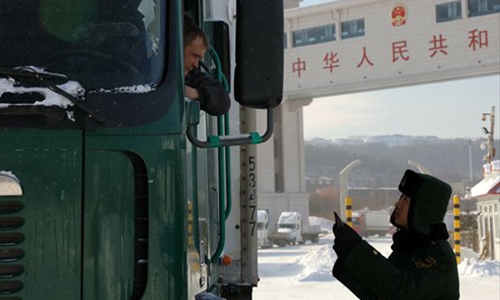As trucks pack at border, calls rise for easing to support China-Russia trade
By Chu Daye Source:Global Times Published: 2020/5/21 19:08:40

A security officer checks a truck at the border checkpoint in Suifenhe in Northeast China's Heilongjiang Province.Photo: IC
Chinese and Russian transport authorities may allow more freight trucks to pass through border checkpoints under proper epidemic control and prevention measures to relieve a backlog at the border, according to a Russian media report.
The reported move comes as China-Russia bilateral commerce is facing rising pressure in the second quarter due to the COVID-19 pandemic and disruptions of cross-border logistics.
Hundreds of trucks backed up on the Russian side outside Manzhouli in North China's Inner Mongolia Autonomous Region and Suifenhe in Northeast China's Heilongjiang Province, two key land ports between China and Russia, as China strengthened Covid-19 control and prevention measures after a Russian driver was found to be a suspected case.
Russia has the second-largest number of coronavirus infections globally with 308,705 confirmed cases as of Thursday, according to data from Johns Hopkins University.
The Russian transport authority hopes China could significantly resume throughput at the border ports, Russian news portal sputniknews.cn reported on Thursday. Suifenhe started to clear 30 trucks a day instead of 10 last week from Monday.
A Chinese merchant based in Suifenhe who specializes in China-Russia trade confirmed the news to the Global Times. China's Ministry of Transport did not reply an inquiry for a comment as of press time on Thursday.
Another source in Suifenhe, a government official who declined to be identified, said the city had found two Russian drivers who tested positive for the coronavirus since the outbreak began.
The city has since enhanced "closed-loop" monitoring for Russian truck drivers, and now most of them return to Russia after offloading cargoes on the same day as they entered China, the source said, adding that nucleic acid tests are run for Russian drivers every five days.
Song Kui, president of the Contemporary China-Russia Regional Economy Research Institute in Northeast China's Heilongjiang Province, said the decision would be "out of the dire need" for bilateral economic cooperation and resuming logistics links is a necessity to prevent further damage to trade.
"Getting logistics channels functioning again is the prerequisite for fulfilling foreign trade contracts, which will have a vital role in shoring up trade in the second quarter," Song told the Global Times, adding that cargo trade is relatively easy to be kept under close inspection and quarantine control compared with passenger traffic.
China-Russia trade rose 3.4 percent on a yearly basis during the first quarter. China imported $16.2 billion in goods from Russia during the first quarter, the fastest growth rate among China's major trading partners, with a 17.3-percent increase year-on-year. Chinese exports to Russia declined 14.6 percent to $9.15 billion.
However, that momentum is now risked as the coronavirus outbreak has worsened in Russia since April and Suifenhe saw an influx of infections from Russia.
RELATED ARTICLES:
Posted in: INDUSTRIES,MARKETS,BIZ FOCUS